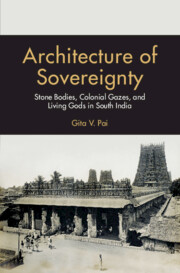Book contents
- Frontmatter
- Dedication
- Contents
- List of Figures
- Acknowledgments
- Notes on Transliteration and Spelling
- Introduction: Sovereignty’s Trace in Architectural Forms
- Part I Stone Bodies
- Part II Colonial Gazes
- Part III Living Gods
- Epilogue: Rejecting the State—Priestly Devotion and Protest in Modern Madurai
- Bibliography
- Index
7 - Producing Heritage: Culture as Commodity in Contemporary Madurai
Published online by Cambridge University Press: 19 April 2023
- Frontmatter
- Dedication
- Contents
- List of Figures
- Acknowledgments
- Notes on Transliteration and Spelling
- Introduction: Sovereignty’s Trace in Architectural Forms
- Part I Stone Bodies
- Part II Colonial Gazes
- Part III Living Gods
- Epilogue: Rejecting the State—Priestly Devotion and Protest in Modern Madurai
- Bibliography
- Index
Summary
Introduction
Most Hindu worshippers visit temples for darśan—“to see and be seen” by the enshrined deity. More than merely places to pray, temples can also be communal spaces to celebrate religious festivals, attend musical performances, or sit and socialize informally. As pilgrimage sites, some temples draw devotees and tourists from afar. For this reason, a few major temples in the south Indian state of Tamil Nadu house museums within their complexes, to educate the public and at times generate additional revenue through entry fees. For example, the Raṅganātha Svāmi Temple Museum in Srirangam contains Nāyaka-period ivory sculpture, metal inscriptional plates, and weaponry; the museum at the Bṛhadīśvara temple in Tanjavur, a UNESCO World Heritage Site, publicizes the Archaeological Survey of India's conservation work of Cōḻa-period paintings.
The museumification of living cultural and religious forms has also occurred at the Mīnākṣī-Sundareśvara temple through its Temple Art Museum in the Āyirakkāl Maṇḍapam (‘thousand pillar hall’). Plans are underway for a proposed second museum in its other pillared hall, Pudu Maṇḍapam, a project backed by temple administrators, state officials, and local businessmen. Interviews with state and municipal government officials, local entrepreneurs, and temple personnel in Madurai and Chennai between 2009 and 2022 illustrate the complex and conflicting stakes surrounding government and private sector attempts to remove commerce from inside the maṇḍapam, a long-standing place of business and craft trade. The efforts to transform the maṇḍapam are related to larger endeavors to produce ‘heritage’ as a commodity that can be marketed in the context of a growing cultural tourism industry. When completed, the finished museum will reconfigure the everyday life of the temple, transforming the ephemeral spiritual affects of the temple into static, ahistorical displays that appeal to foreign tourists, including foreign nationals of Indian ancestry and visitors from other parts of India. By building museums, educated middle- and upper-class residents of Madurai hope to represent a Tamil identity coinciding with the globally determined format of ‘heritage.’ In their bid to accumulate cultural and social capital, the elites repackage versions of local culture they deem ‘traditional’; from a desire to make themselves and Madurai appear less ‘backwards’ and more ‘modern,’ they are transforming the temple into a more palatable (and more profitable) form.
From ma apam to museum
The Āyirakkāl Maṇḍapam sits past small shops in the Vīravacantarāyar Maṇḍapam, where visitors enter the eastern gōpuram of the Madurai temple.
- Type
- Chapter
- Information
- Architecture of SovereigntyStone Bodies, Colonial Gazes, and Living Gods in South India, pp. 241 - 280Publisher: Cambridge University PressPrint publication year: 2023



